Do Poodles Bark A Lot? All Your Questions Answered In 2025
Poodles are intelligent, friendly, and sociable dogs that make excellent companions. They are known for their keen senses and lively personalities, but this often comes with a tendency to be vocal.
So, do Poodles bark a lot? The answer is yes, Poodles are prone to barking, but there are reasons behind this behavior.
By understanding their barking habits and addressing triggers, Poodle owners can find ways to manage it effectively.
Let’s explore why Poodles bark so much and how you can reduce unnecessary barking.
Yes, Poodles Are Known for Barking
Poodles are a vocal breed, and they use barking as a form of communication. Whether it’s a Toy, Miniature, or Standard Poodle, all sizes share the tendency to bark.
This vocal trait can be traced back to their origins as working and hunting dogs, where alert barking was useful for their human companions.

However, while Poodles may bark frequently, they are not the most vocal breed compared to others. Their barking often has clear triggers, making it easier for owners to understand and control.
The bottom line is that Poodles bark to communicate, and with proper attention, training, and care, their barking can be managed to prevent it from becoming excessive.
Why Do Poodles Tend to Bark?
There are several reasons why Poodles may bark more often than other dogs. Their intelligence, sensitivity, and curiosity make them quick to react to their environment.
Here are some common reasons for their barking:
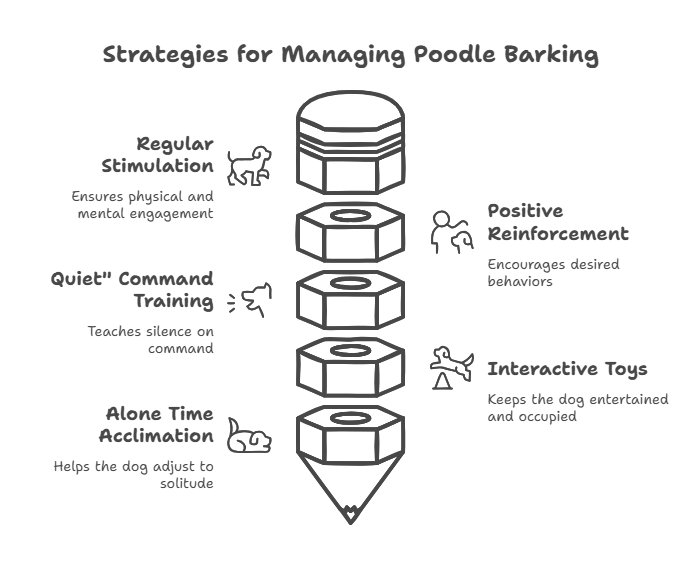
- Alerting to Strangers or Noises: Poodles are natural watchdogs and may bark to alert their owners of visitors, unfamiliar noises, or movement outside.
- Excitement: When meeting new people, seeing familiar faces, or during playtime, Poodles may bark out of excitement.
- Boredom: Poodles are highly intelligent and require regular mental and physical stimulation. Without it, they can bark out of boredom.
- Loneliness or Separation Anxiety: Being left alone for extended periods can cause anxiety, leading to excessive barking as a way to express their discomfort.
- Protection: Poodles may bark to protect their home, family, or territory from perceived threats.
- Startling Sounds: Sudden noises like sirens, fireworks, or thunderstorms can trigger barking.
Understanding the cause of your Poodle’s barking is the first step to addressing it.
While some barking is natural, excessive or nuisance barking can often be managed through training and environmental adjustments.
Read More = Can Poodle Get Fleas
How to Stop Your Poodle From Barking Too Much?
Understanding why your poodle is barking is the first step in stopping excessive noise. Poodles bark for a variety of reasons, including boredom, anxiety, or the desire for attention.
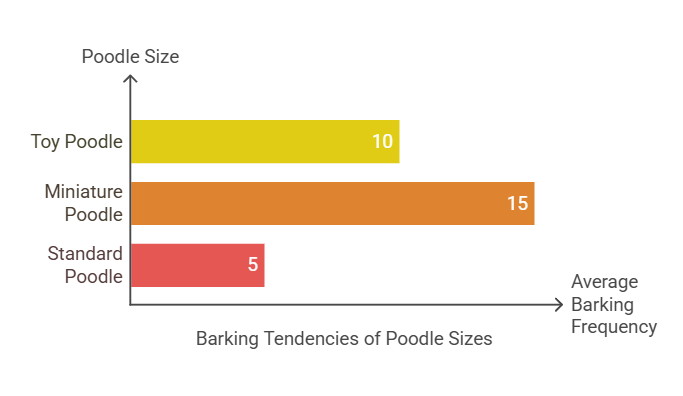
By identifying the cause, you can address the behavior more effectively. Take note of the situations when your poodle barks the most, and this can give you clues about what might be triggering the noise.
One of the most effective ways to stop a poodle from barking too much is to ensure they get enough physical and mental stimulation. Poodles are highly intelligent and energetic dogs that require regular exercise.
If your poodle isn’t getting enough playtime, walks, or mental challenges, they may resort to barking to release pent-up energy. Providing a structured routine with ample exercise will reduce the chances of excessive barking.
Positive reinforcement is a key tool in training your poodle to stop barking. When your poodle stops barking on command or remains quiet in a triggering situation, immediately reward them with treats or praise.

This will help them associate silence with positive outcomes. Over time, your poodle will learn that being quiet earns them attention and rewards, while barking excessively does not.
Training your poodle to understand the “quiet” command can be a game-changer. Start by allowing them to bark once or twice, and then say “quiet” in a calm but firm tone. When they stop barking, immediately reward them.
Repeat this process until your poodle responds to the command and understands that being quiet is expected. This method can help curb unnecessary barking in various situations.
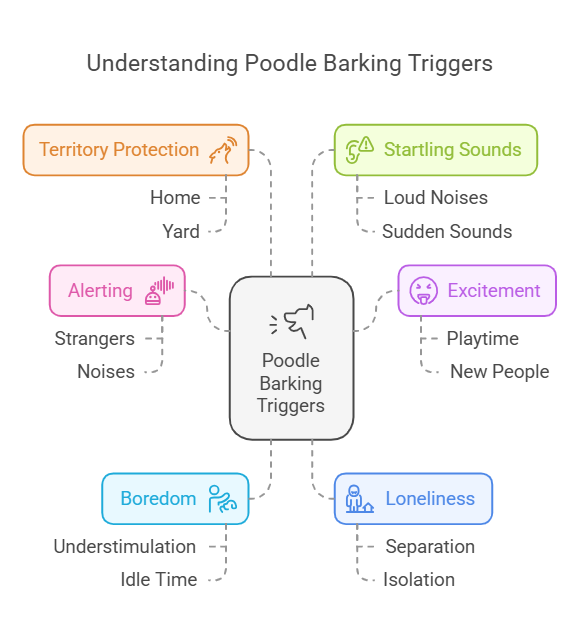
Ensuring that your poodle’s needs are met is also crucial in preventing excessive barking. Dogs often bark when they feel neglected or anxious. Make sure your poodle is not only physically active but also emotionally fulfilled.
Spend quality time with them, provide mental stimulation, and address any anxiety-related issues they may have. By meeting their emotional needs, your poodle is less likely to bark for attention or due to stress.
Read More = Tips For Traveling With Pets
Is Barking a Sign of Stress in Poodles?
Yes, excessive barking can often be a sign of stress in poodles. If a poodle feels anxious, threatened, or overwhelmed, they may bark as a way of expressing their discomfort.
Separation anxiety, for example, is a common cause of barking in poodles, especially when they are left alone for long periods.
It is essential to recognize the signs of stress, such as panting, pacing, or destructive behavior, and address the underlying issue to reduce barking.
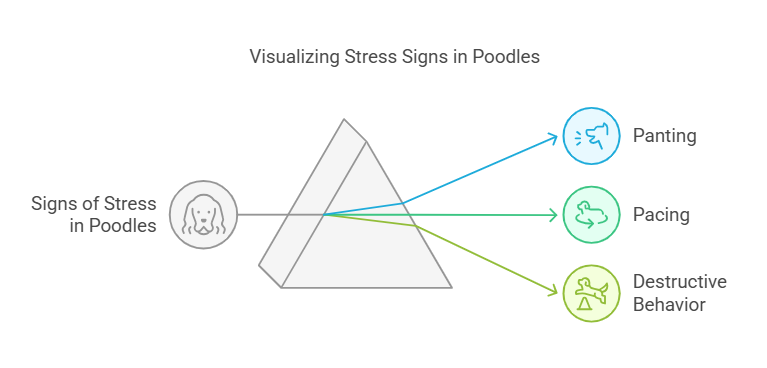
Tips for Managing Separation Anxiety
Separation anxiety is a common reason for excessive barking in Poodles. To help reduce this, try the following:
- Gradually increase the time your Poodle spends alone to help them adjust.
- Leave interactive toys or puzzle feeders to keep them engaged while you’re away.
- Use a pet camera with a voice feature so you can check in and reassure them.
- Consider crate training as a way to provide a safe, secure space.
Are Poodles More Likely to Bark Than Other Breeds?
While all dogs bark to some extent, poodles may be more inclined to vocalize compared to certain other breeds.
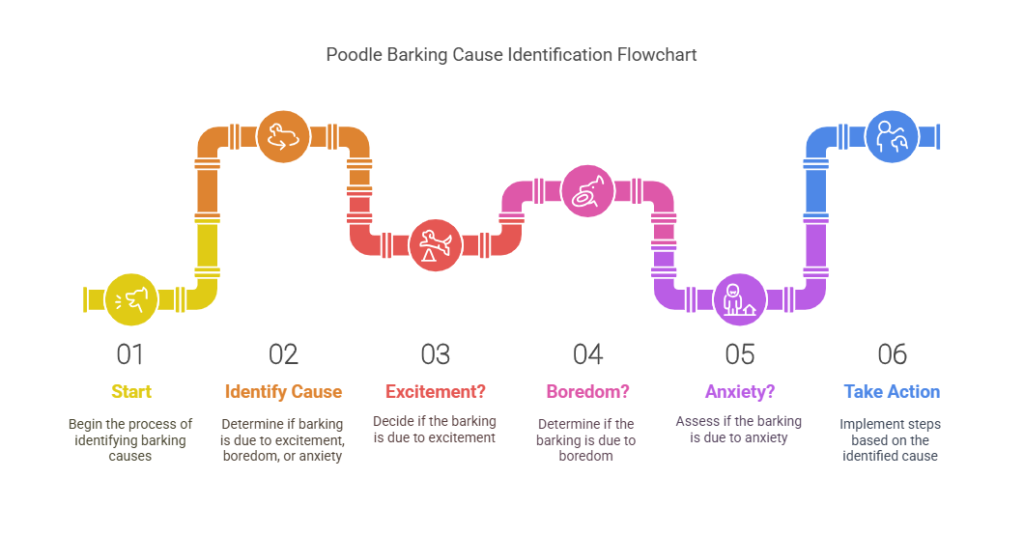
Poodles, particularly Toy and Miniature Poodles, tend to be alert and sensitive, making them more reactive to stimuli. This reactivity can lead to increased barking compared to more laid-back breeds.
However, with proper training and socialization, poodles can learn to control their barking and reduce unnecessary vocalization.
How to Train Your Poodle to Bark Less?
Training a poodle to bark less requires patience and consistency. Start by teaching basic commands like “quiet” or “enough.”
Positive reinforcement plays a crucial role—reward your poodle when they stop barking on command, reinforcing the desired behavior.
Avoid punishment, as it can lead to stress or confusion. Redirect their attention to a toy or engage in a different activity to distract them from barking triggers.
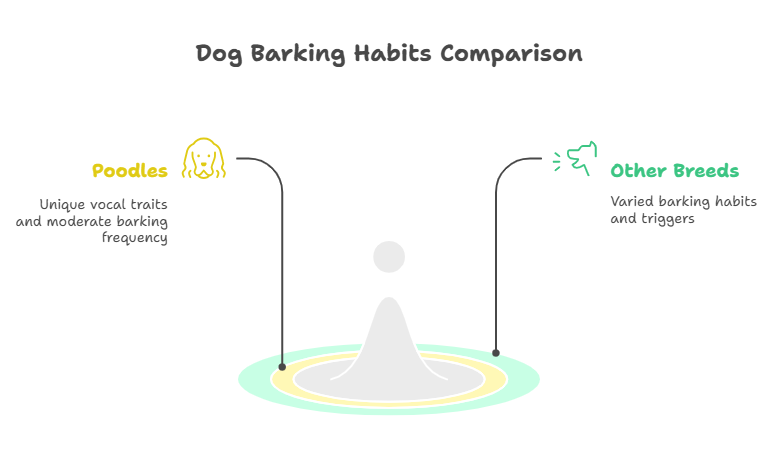
Are Toy, Miniature, and Standard Poodles Equally Vocal?
While all Poodles share similar traits, the size of the Poodle can influence their barking habits:
- Toy Poodles: These small dogs often bark more frequently due to their alert nature and high energy levels. Their small size makes them more prone to reacting to even minor noises or movements. Toy Poodles are quick to vocalize their excitement, fear, or frustration.
- Miniature Poodles: Miniature Poodles are slightly larger and tend to have a more balanced temperament. While they are still vocal and alert, they may not bark as frequently as Toy Poodles. With proper training and socialization, their barking habits can often be well-managed.
- Standard Poodles: Standard Poodles, being larger and calmer, tend to bark less often compared to their smaller counterparts. They are often more composed and less reactive to everyday noises. However, they can still bark to alert their owners or express excitement.
Ultimately, barking habits depend not only on the Poodle’s size but also on their training, socialization, and individual personality.
While Toy Poodles are generally the most vocal, any Poodle can develop excessive barking if not properly managed.
Read More = Dog Breeds For Families
FAQs About Poodle Barking
1. Are Poodles naturally barkers?
Yes, Poodles are naturally vocal and use barking to communicate. However, with proper training, their barking can be controlled.
2. Do smaller Poodles bark more than Standard Poodles?
Toy and Miniature Poodles tend to bark more frequently than Standard Poodles due to their size and alert nature.
3. Can training help reduce barking in Poodles?
Absolutely. Obedience training, combined with consistency and positive reinforcement, is highly effective in managing barking.
4. Why does my Poodle bark when left alone?
Barking when left alone is often a sign of separation anxiety or boredom. Providing interactive toys and gradually increasing alone time can help.
5. Are Poodles good watchdogs?
Yes, Poodles are excellent watchdogs. They are alert and quick to bark at unfamiliar sights or sounds, making them great at notifying owners of potential intruders.

Final Thoughts
Yes, Poodles are known for being a vocal breed. Whether it’s to alert you, express excitement, or communicate boredom, barking is a natural behavior for them.
While this can sometimes become excessive, it is manageable with proper training, exercise, and addressing the root causes.
By understanding why your Poodle barks and implementing effective strategies, you can help your furry friend become a quieter, happier companion.








